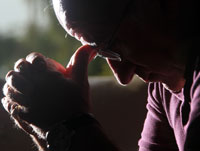
Mental health in-patient services are failing due to overcrowding, unsafe environments and a lack of therapy, the Royal College of Psychiatrists has warned.
Key standards for patient care are not being met in areas including one-to-one interaction between patients and staff and patient involvement in care planning.
While recognising that this “costly area” would be earmarked for efficiencies due to current fiscal constraints and the emphasis on providing care in the community, the college said “quality in-patient care is as vital as ever” for those in severe need.
The warnings came in a paper from the college setting out 10 standards that it said in-patient services should be meeting.
Drawing on surveys by the Care Quality Commission and Mental Welfare Commission in Scotland and the college’s own Accreditation for Mental Health Inpatient Mental Health Services (Aims) research, it found:
• Average bed occupancy rates were well above the optimum of 85%, leading to patients becoming more unwell due to long waits for beds and reduced safety on wards. The CQC has found that just one-fifth of acute wards met the 85% standard.
• Though segregated gender accommodation was “essential for vulnerable patients, mainly women”, just 59% of wards had gender-segregated lounges, according to Aims data.
• Safety standards were not being met with less than 45% of patients always feeling safe (CQC).
• Despite the importance of patient involvement in care planning to recovery, 40% of patients did not feel involved in all the decisions about their care (Aims).
• Just half of patients said they had supportive one-to-one meetings with staff for at least 15 minutes each day (Aims), despite the importance of staff contact.
• Patients lacked access to psychological therapies despite guidelines recommending at least one psychological intervention per week for in-patients.
The college also called for wards to have a maximum of 18 beds, good provision of activities, links with the community and culturally-appropriate care.
It called on mental health trusts and health boards to use the standards outlined in the report as a checklist for improving services.
The report is being formally launched next week as part of the college’s international congress.
What do you think?Join the debate on CareSpace
Keep up to date with the latest developments in social care. Sign up to our daily and weekly emails
Related articles


 Bournemouth, Christchurch and Poole
Bournemouth, Christchurch and Poole  Hampshire County Council
Hampshire County Council  Lincolnshire County Council
Lincolnshire County Council  Norfolk County Council
Norfolk County Council  Northamptonshire Children’s Trust
Northamptonshire Children’s Trust  South Gloucestershire Council
South Gloucestershire Council  Wiltshire Council
Wiltshire Council  Wokingham Borough Council
Wokingham Borough Council  Children and young people with SEND are ‘valued and prioritised’ in Wiltshire, find inspectors
Children and young people with SEND are ‘valued and prioritised’ in Wiltshire, find inspectors  How specialist refugee teams benefit young people and social workers
How specialist refugee teams benefit young people and social workers  Podcast: returning to social work after becoming a first-time parent
Podcast: returning to social work after becoming a first-time parent  Podcast: would you work for an inadequate-rated service?
Podcast: would you work for an inadequate-rated service?  Family help: one local authority’s experience of the model
Family help: one local authority’s experience of the model  Workforce Insights – showcasing a selection of the sector’s top recruiters
Workforce Insights – showcasing a selection of the sector’s top recruiters 

 Facebook
Facebook X
X LinkedIn
LinkedIn Instagram
Instagram
Comments are closed.